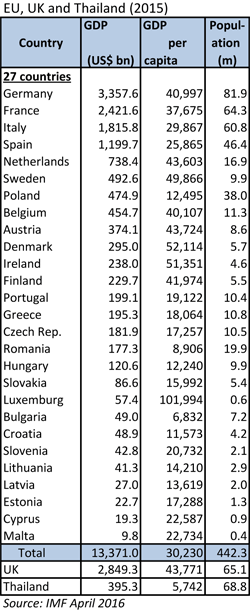Human Resources Watch: what can Thailand learn from "Brexit"?
- Published: Jul 4, 2016 15:45
- Writer: Christopher Bruton | 3,016 viewed
The UK referendum on remaining in or departing from the European Union (EU) was decided with a mere 51.9 per cent majority for departure. An extended period of post mortem debate, recriminations and potentially acrimonious negotiation now ensues. This will not be easy, least of all because the leaders of both government and opposition parties are now totally discredited and on their way out. Scotland hopes to quit the United Kingdom altogether. The victorious "Brexit" leaders appear to have formulated no advance plans to handle the situation.
Add to that a tumbling currency, downgraded credit ratings, and uncertain investment, employment and foreign immigrant and residence situations, and one has as ideal a recipe for chaos as one could possibly devise.
On the mainland of Europe, leaving aside the little offshore island that Britain has now chosen to become, the 27 out of former 28 member states of the EU need to set their own house in order. Hopefully together they can create a better, stronger union to go forward towards the "United States of Europe" that Britain’s own great statesman Winston Churchill proposed in the early post-war years of reconstruction.
Lessons to be learned
Thailand is only indirectly affected by the "Brexit" debacle. Europe is an important trading partner, but there is, as yet, no free trade agreement. The UK is far less important, and may be only too grateful to closen relations with whoever will talk with them, including Thailand. From an investment point of view, the UK is significant for Thailand, but not dominant, with ASEAN and East Asia becoming more important in economic relations. Certainly the reverberations of the UK "Brexit" on the world economy is resulting in shock waves reaching Thailand’s shores, but these will be a passing phenomenon, less important than much greater influences, such as China, ASEAN partners, Japan, and the United States.
However, there are short-term effects of "Brexit" that can offer valuable lessons for Thailand, from a general and particularly from a human resources viewpoint. We may highlight the following:
How to conduct a referendum:
The UK "Brexit" debate was highly divisive, splitting political parties, commercial organisations, even families and friendships. Discussion and debate can be useful democratic activities, but they can also be highly destructive. Perhaps the less discussion, the better. Just vote, if you really have to hold a referendum at all, and have done with it;
Consider the outcome, and have a "Plan B":
Most people in the UK/EU referendum appear to have assumed that the result would be to remain in the EU. Therefore neither the proponents nor the opponents had considered what to do if the vote went against the "remain" option. One does need to consider all options and make clear what would be the outcome in either case;
Determine what would constitute a decisive result:

The UK referendum resulted in a vote of only 51.9 per cent for "Brexit". Such a majority, leaving a large proportion of dissenting voters, suggests shortcomings rather than virtues of democracy. With such an important issue as "Brexit", surely a two-thirds majority should have been required. The result will affect younger people rather than old. Younger people apparently supported "remain" and are thus disenfranchised;
If immigration is a big issue, define present and future policies:
Britain has benefitted from steadily increasing immigration, both from EU and non-EU sources, over the past 25 years. Without such immigration, many highly-skilled, and also essential but less-skilled services could not be performed.
The "Brexit" vote has left literally millions of people in a state of uncertainty. It is unclear how EU citizens and non-EU citizens may be differentiated. Negotiations on free trade may require bargaining as between trade privileges and immigration privileges.
Very evidently Thailand could be faced with similar issues when developing the ASEAN Economic Community and possible entry into the Trans Pacific Partnership (TPP);
How to implement trans-national laws and regulations:
The UK is now faced with retaining or modifying a host of EU-related laws and regulations. As part of ongoing trade and other relations, the UK may be bound by future EU regulations, over which, as a non-member, there will be no control.
Certainly Thailand will need to look very carefully at similar possible regulations, including those affecting skills, qualification recognition and other labour regulations;
Finally, before entering, one needs to locate the "fire exit":
The UK is now stuck with a complex exit strategy, which will take years to analyse and implement. Thailand has entered into the AEC, already with some reciprocal labour-related stipulations with more possibly to follow. TPP regulations may be particularly pervasive and onerous. Too often contractual relations fail to specify the terms and conditions for termination. This certainly needs to be taken very seriously, noting the bitter "Brexit" experience.
This is a year of change: many countries are going through election and referendum processes. It is certainly good to look over one’s shoulder and seek to benefit from the experiences of others, to avoid one’s own miscalculations and mistakes.
Christopher F. Bruton, 45 years in Thailand, is Executive Director of Dataconsult Ltd, a local consultancy. He can be reached at chris@dataconsult.co.th.


